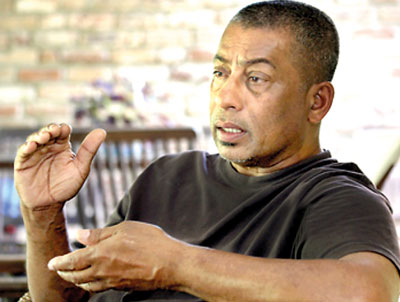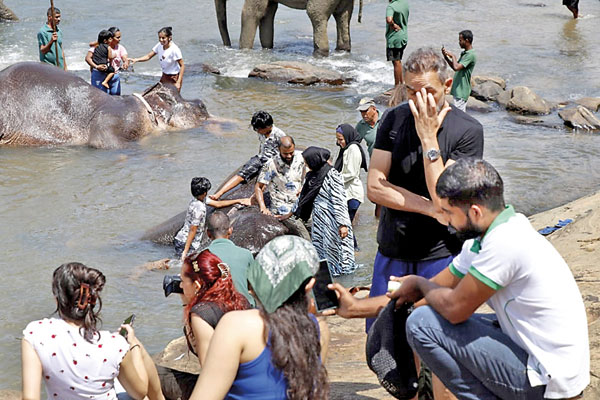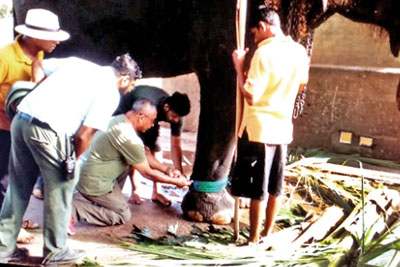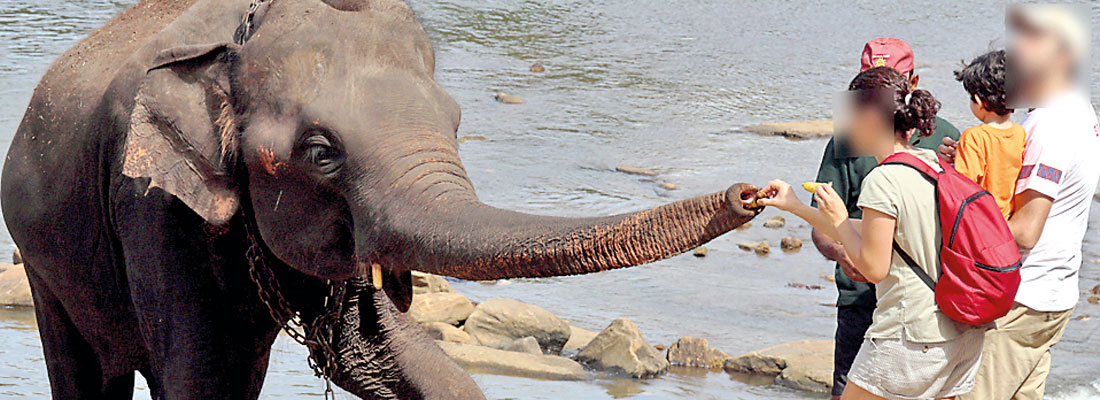News
Expert points to “very dangerous” elephant abuse at Pinnawela
View(s):- Says animals suffer from stress and behavioural changes due to tourist activities; aggressive troublemakers are chained heavily and kept hidden in a barn

Vasantha Nugegoda explains the pain the elephants suffer due to tourist activities
By Kumudini Hettiarachchi
As environmentalists question whether Sri Lanka did the right thing by agreeing to repatriate Muthu Raja to Thailand, an expert turns the searchlight on the Pinnawala Elephant Orphanage and other issues with captive and domesticated elephants here in this country.
Focusing his sights on Pinnawala where there are around 65 elephants, international expert Vasantha Nugegoda says that keeping elephants in the river for a long time and allowing strangers to climb onto them and scrub and bathe them over and over again is not good for them. It is pathetic to see these majestic creatures lying on one side while photographs are taken. While it is “very bad” for these elephants as it stresses them out, it is also “very dangerous” for the tourists bathing them.
He cautions against allowing strangers to feed bananas to the Pinnawala elephants as that too is stressful for them. Such practices change their social behavioural patterns and will make them “begging” elephants! These bathing and feeding practices also make them averse to being with their herd.

The bad practice of getting visitors to help bathe the elephants. Photo courtesy of Vasantha Nugegoda
Mr. Nugegoda talks with much emotion about some male elephants, dubbed troublemakers, chained heavily day and night in a barn at Pinnawala and “kept hidden” across the river from the orphanage. The barn elephants are not taken to water daily, only once a month which is not good for them. There should be implementation of rules for the welfare of these animals as such treatment aggravates their aggression towards the herd and the public. It is a disaster waiting to happen.
“When I was an advisor to the government some time ago, the elephants tied to trees or in a barn for over two years were released to the Kala Wewa area. This, however, is not the best solution. There should be a special park for aggressive animals and trained staff to look after them,” he said.
He also turns his attention to the elephants regarded “usavi banda” (court productions) which are kept in isolation at Pinnawala, without allowing them to socialise with the herd. They are suffering.

Expert Vasantha Nugegoda showing how to restrain an aggressive elephant without chaining it at Pinnawala. Pic by Srilal Miththapala
If there are surplus elephants at Pinnawela, the authorities should consider selling not donating some of them to reputed zoos worldwide, under strict conditions. This would also help to protect the gene pool of the Sri Lankan elephant species as, otherwise, inbreeding could pose a major threat, says Mr. Nugegoda, citing the case of China loaning a pair of prized pandas at a cost of US$ 1 million. The cash thus received could be used for the development of Pinnawala and the Dehiwela Zoological Gardens.
Meanwhile, he provides a checklist the Department of Wildlife Conservation (DWC) should tick meticulously whenever an elephant is handed over to an institution such as a temple or is in the possession of a private individual:
· Is there adequate land in the form of paddocks for the elephant? This should not include concreted areas. These animals need good ‘bedding’ in the form of thick sand. Otherwise, they would suffer from serious foot conditions if they stand on their own urine and excreta. This is why earth and not concrete is essential.

The bad practice of tourists feeding the elephants at Pinnawala
· Is there adequate food such as kitul and a mix of leaves?
· Do they have adequate water either in a river or a pond where they can submerge themselves fully and relax without putting their weight on their legs?
· If these elephants have to be secured, are the owners using leather/canvas belts and small but strong chains, not heavy chains that injure the animal?
| The suffering behind elephant rides for tourists It is a loud “no” from expert Vasantha Nugegoda to elephant-riding by tourists on steel or wooden howdahs placed on the animal’s spine, with the animal being made to walk on burning hot tarred roads. “The weight is uncomfortable for the elephant and the heat of the roads is not good for his footpads,” he says, pointing out that there is no law governing such rides. Licences are issued for captive elephants but nothing is stipulated on the licence. There are also no checks on these elephants after these licences are granted, including random checks on the routes used. These voiceless creatures are at the mercy of those who have such a licence, and who may also be hiring them out to others for this type of work as well as hard labour, he says. Mr. Nugegoda suggests that the DWC should have a list of professional experts who could provide training to new owners at the time each new licence is issued. They could also carry out monthly or quarterly inspections. | |
The best way to say that you found the home of your dreams is by finding it on Hitad.lk. We have listings for apartments for sale or rent in Sri Lanka, no matter what locale you're looking for! Whether you live in Colombo, Galle, Kandy, Matara, Jaffna and more - we've got them all!

